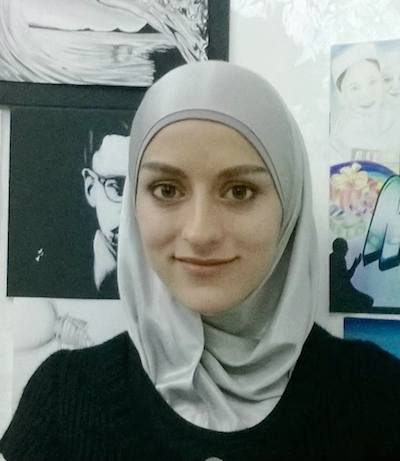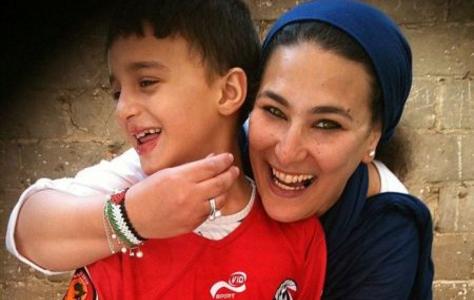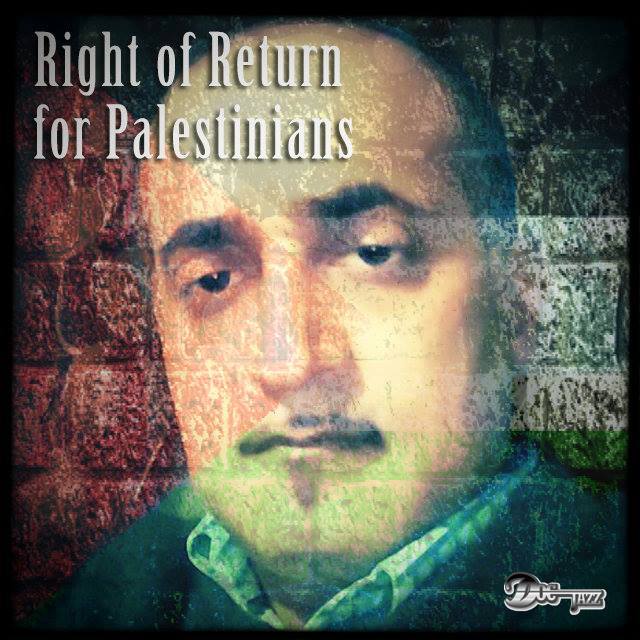Nabil Mansour about his new song ‘Yasmin’
 Nabil Mansour, the brilliant Palestinian musician from Barcelona, has released a new song – his first song in the Catalan language – called ‘Yasmin’. Doc Jazz interviewed Nabil about this new production, which was released with an animated music video made by Palestinian graphical artist Maysun Cheikh Ali. Nabil gives us the deeper backgrounds of this very special song, and we have some personal comments from Maysun as well, so read the interview and most importantly, check out this lovely song. You will find it practically impossible not to be touched and moved by it.
Nabil Mansour, the brilliant Palestinian musician from Barcelona, has released a new song – his first song in the Catalan language – called ‘Yasmin’. Doc Jazz interviewed Nabil about this new production, which was released with an animated music video made by Palestinian graphical artist Maysun Cheikh Ali. Nabil gives us the deeper backgrounds of this very special song, and we have some personal comments from Maysun as well, so read the interview and most importantly, check out this lovely song. You will find it practically impossible not to be touched and moved by it.
Doc Jazz: Dear Nabil, thank you for being prepared to share your thoughts and feelings with us about your splendid new song. Please tell us: how did this new song come about? What inspired it?
Nabil Mansour: Last time I was in Palestine, a very special person touched me deep inside with her sadness. It was in the Nablus refugee camp of Balata. She was an old woman, no brightness was left in her eyes, she moved slow and heavily, but when talking, she stared me right in the eyes, and told me her story: she had 2 children, and both died as a consequence of military incursions of the Israely army inside her refugee camp. The woman related to me that the boys had died several years ago (on the second intifada days), and that every single time she blinked her eyes, in that milisecond of time, she believed when she opened her eyes again she would see her kids alive in front of her, and then the nightmare would have ended…
I felt the woman was living stuck, stuck in a past she could never move forward from. Her time line stopped the moment her boys stopped breathing. I was very much shocked for several days afterwards. I could understand how much difficult must be for a father to lose a son, but I had never felt it in my veins the way I felt it then. Then I decided to share my feeling telling this story in conferences, and it eventually turned into a song about the subject.
Doc Jazz: That is indeed a moving subject that touches very directly on human suffering. One can clearly hear in the song that it comes straight from the heart. What are you telling us by relaying this story, what is the message? Is this a political song?
Nabil Mansour: I believe the Western mass media has managed things in a way that the suffering of the Palestinian people is not seen or felt enough. I can’t believe things such as the fact that almost no one in the western countries knows, for instance, one name of the seven members of the same family who were slaughtered in the Gaza beach in 2006. I have seen those images tens of times, and they cross my mind from time to time, the images of the little girl, the only survivor, crying like crazy, watching one by one all of the members of her family who just got killed in front of her eyes, screaming to her dead father “wake up yaba, wake up!” and it annoys me that it is no news, or fast news (khabar 3ajel, as Mahmoud Darwish described it in his unforgettable poem “3ala shate’ el ba7r benton”).
It makes me sick to know that every single day there are hundreds of Palestinian “fast news” that actually become no news for mass media in the west. I felt I had my musical chance to try to let people empathize with the ones who lose their beloved ones every day in Palestine because of the ilegal occupation and the military regime that’s oppressing them. The song is sad, very sad, but yet very real as well.
Doc Jazz: Indeed it is, I agree, it is quite sad but also very genuine. I am glad you decided to release the video with English subtitles, so that we were able to understand what is being said. This is your first song in the Catalan language. Is there a specific reason for this?
Nabil Mansour: Catalan is one of my languages as I am raised in Barcelona and have live here all my life. Catalonia has been traditionally very pro-Palestinian, but lately we have zionist incursions and the new government is very pro-Israeli. So this song is a part of a local struggle not to let the good people of Catalonia be fooled by this new trend that is definitely trying to make them believe Israel is an example to follow. I am very positive we’ll win this struggle again. Catalonian people suffered the fierce repression of the days of the dictator Franco, so they can fully understand the Palestinian cause.
Doc Jazz: I am sure your song can help them increase that understanding. As for that lovely animated music video, the drawings are so pure and powerful. As I understand, Maysun Cheikh Ali is the genius behind that video. Can you tell us a little more about her?
Nabil Mansour: She is an amazing, amazing artist. Since the very moment I created the song, I knew I wanted this kind of animation for it. One day a friend of mine sent me a video of Maysun that had just been awarded in an important festival, and when I saw it I just knew I found the right person. Maysun uses her pencil with a sensitive excellence not easy to find. She is very special. It was my pleasure and I was quite lucky to find her on my musical struggle way.
Doc Jazz: Indeed, I would agree with that, and we are also lucky to have a personal comment from Maysun herself in this interview. The drawing you see here is also from the hand of this talented artist.
MAYSUN CHEIKH ALI:
 I´m glad that I have worked with Nabil. The lyrics of the song and the content of the video are about the daily life of the Palestinians struggling to cope with life. Particularly concerning the life of children as victims of occupation. One of the most highlighted points through the song and the animation is the Zionist occupation’s trials to tear apart the lifes of the Palestinians.
I´m glad that I have worked with Nabil. The lyrics of the song and the content of the video are about the daily life of the Palestinians struggling to cope with life. Particularly concerning the life of children as victims of occupation. One of the most highlighted points through the song and the animation is the Zionist occupation’s trials to tear apart the lifes of the Palestinians.
Yasmin is a 8 year old child, who wants to go to school. The occupation is preventing her from fullfiling her dream. This is not just the case of Yasmin, there are thousands of other Palestinian children who have suffered and still suffering the same. While I’m addressing you right now, there are numerous cases like this taking place.
Doc Jazz: Thank you Maysun for this powerful explanation. It is great to hear you express in words what you have conveyed so artfully in your lovely music video. One last question to you now, Nabil: what are your hopes and aspirations for this song, in other words, what would make this song feel like a success to you?
I hate to make people cry, but when I play this song in concerts and I see tears falling down the cheeks of the audience, I feel like it really reached people deep inside. I just hope it will touch people. Being in the musical business is trying to feel emotions and make people feel emotions. I pretend to personalize the Palestinian suffering, move it closer to the standard listener, move him/her inside Palestine, inside Balata refugee camp, let him listen to what el 7ajja Wafiyyeh told me about her kids, and check how it feels. It hurts the same if it happens to a neighbour close in your city that becomes front page news, or to that Palestinian mother whose suffering is not reflected anywhere. This song intends to be the amplifier of that mother, and I hope the hearts of listeners switch to the beat of this tune.
Doc Jazz: We thank both these talented Palestinian artists, Nabil Mansour and Maysun Cheikh Ali, for the privilege of featuring their thoughts here at the Musical Intifada. One can only hope that such collaborations continue, and that the message of the Palestinian people is brought to the world in as many languages, styles, and artistic ways of expression as possible. This fits the mission of this Palestinian website, and we hope to hear more from you in the future!
Note: also read our previous in-depth interview with Nabil Mansour, for more information about this highly talented and inspiring Palestinian musician!




Recent Comments